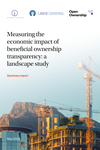Measuring the economic impact of beneficial ownership transparency (summary report)
Help us understand how you are making use of resources from the Open Ownership website by filling out this short survey
Publication type
Research report
Publication
Summary
Existing literature makes a strong case for beneficial ownership transparency (BOT), particularly when it comes to tackling issues such as money laundering and other illicit financial flows. To date, however, little research has sought to quantify the economic benefits of BOT reform. This is a potential obstacle for informed policy making. Between January and March 2022, Oxford Insights and Lateral Economics conducted research for Open Ownership to help understand what economic benefits can be expected from beneficial ownership transparency policies and how we can measure their extent. It looks at what has been done so far to measure the economic impact of BOT and how quantitative evidence might be used to advance BOT policymaking in the future.
This is the summary report. The full report is available here.
Key recommendations
We set forth a number of key considerations for governments, international organisations and civil society. Whilst some of the recommendations outlined below can be broadly applied to all of these groups, we recognise that governments in particular have a key role to play in any efforts to measure the economic impact of BOT, as the stewards of the public datasets needed to assess impact in a number of benefit areas.
- Focusing on particular benefit types in relation to specific policy goals is likely to be the most practical approach to studying the economic benefits of BOT.
- To strengthen the understanding of the economic impact in the short-term, survey-based approaches within areas such as investigation times for enforcement agencies, the prevalence and profitability of organised crime, or due diligence costs within the private sector have the potential to supplement the existing economic argument in favour of BOT.
- Governments implementing BOT reforms should conduct impact assessments and publish their findings to help understand the economic case for BOT across jurisdictions.
- In order to support more robust research to quantify the impacts of BOT in the future, and for their own monitoring and evaluation purposes, governments need to start tracking baseline data points now.
- As the BOT policy area matures, further work should consider how specific design elements may lead to specific economic benefits.
- The Financial Action Task Force could play a role in supporting countries seeking to track the impact of BOT reform by publishing guidance around collecting and analysing statistical evidence for BOT.

